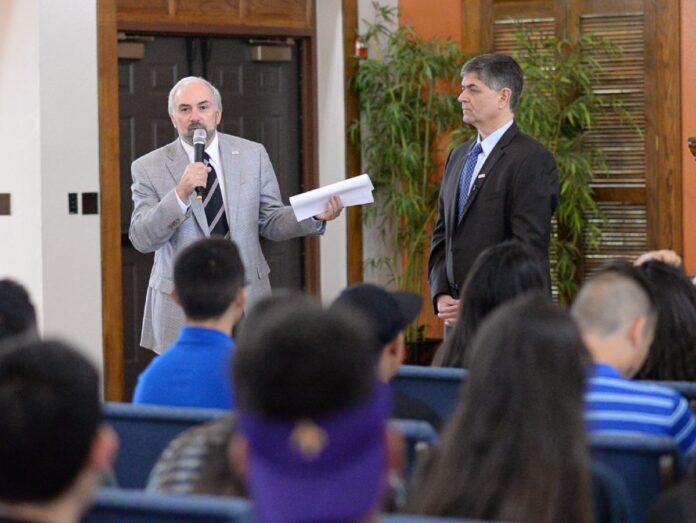BROWNSVILLE — U.S. Rep. Filemon Vela and University of Texas Rio Grande Valley President Guy Bailey on Monday hosted a group of Rio Hondo Upward Bound students on UTRGV’s Brownsville campus.
Upward Bound is a federal program to help students from disadvantaged backgrounds get into college. On one hand, the event was an opportunity for Bailey to pitch UTRGV to the young people in the audience pointing out the various fields of study available, including medicine, coastal studies and fine arts. He also discussed the wide availability of Pell and Texas grants.
“Eight percent of freshmen last year paid no tuition and no fees,” Bailey told the students. “There’s a good chance you won’t have to pay very much.”
After the event, held at El Gran Salon at the Student Union, he said the goal “is to get these kids in higher education” to accomplish great things.
“We want them here, but we want them to go to college,” Bailey said. “That’s the most important thing. If they go to A&M or to UT Austin, that’s OK too. But we’d love to have them. We want them to have the smoothest pathway to college possible.”
The event also served as an opportunity to thank Vela for his work in helping secure ($4.4 million) in Upward Bound funding for Cameron County, Bailey said. UTRGV announced last month that it will receive nine federal Upward Bound grants totaling nearly $14 million over the next five years, creating new Upward Bound programs in the Valley and allowing existing programs to continue.
“Dr. Bailey and Congressman (Henry) Cuellar announced these upward bounds grants in Hidalgo County, and I think (UTRGV) wanted to make sure that people understand that these grants are awarded Valley wide,” Vela said. “Students throughout the Valley benefit when we fund these programs.”
The gathering was also the setting for Vela to announce a planned internship program aimed at giving UTRGV students a chance to work for one of the Valley’s three congressional representatives, currently Vela, Cuellar and Vicente Gonzalez.
Vela said he typically has 12 to 15 university interns a year starting in June, and four or five in the fall and winter semesters.
“The reality is, because of the cost of living in Washington, a lot of times the students who don’t have the money to go do it on their own don’t have that option, so we have to develop programs that will give students whose parents can’t afford it the option to do that,” he said.
There are internship fellowship and scholarship programs out there, but nothing designed specifically for UTRGV students, Vela said.
“I have had an intern from the Texas A&M system every school semester since I have been in Congress,” he said. “The University of Texas and Texas A&M and Texas Tech have very consistent intern programs, but it takes money to do that. Right now UTRGV is relying on programs that service many other universities as well.”
The plan, initially at least, is to send three students at a time as interns, one per congressman’s office, for a total of nine students a year. Vela estimates it will take about $75,000 to get it off the ground.
“We’re going to have to raise it locally,” he said. “And now that I’ve announced the program I’m committed to it. I think that it is realistically feasible to develop a program and raise the money to sustain a program that will allow the university to send nine students throughout the year to work in our offices.”
Vela said working as an intern in Washington is a life-changing experience in addition to counting as college credit.
“I know it’s beneficial because I deal with the kids all the time that benefit from being there,” he said. “I was an intern. … Now we have people who began as interns in my office that are actually full staff members. I just think we have to have a consistent program that gives students who don’t have those opportunities the ability to do it.”
Bailey said the university hopes to start the congressional internship program in fall 2018.
“We’re working on the funding right now,” he said. “We’ll start with three and then try to expand it. That’s something that universities around the country have, and we think our students deserve the same opportunities.”





